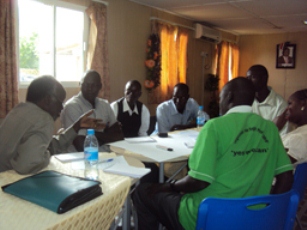Rights body advocates for citizens participation in transitional justice
May 24, 2015 (KAMPALA) – The South Sudan Human Right Society of Advocacy (SSHURSA) has embarked on educating the various youths and women who fled or have crossed in neighboring Uganda about issue of transitional justice on post-conflicts in South Sudan.

“By these few people coming together they could be able to get the knowledge’s and skills and understanding basic principle of transitional justice, and they will be able to spread the message within their communities,” said Biel.
He argued that bringing together South Sudanese was a good idea as solutions are being sought on whether to opt for persecution or take people to face court or a truth and reconciliation commission.
“Although there is violent on the civil war in South Sudan, we believed that one time, one day peace, will come to South Sudan and South Sudanese will remain being South Sudanese a country for all the citizens of South Sudan whereby there is need, therefore it high time that people are brought together and discuss this issue in advance,” stressed the official.
PARTICIPANTS SPEAK OUT
Tap Guek, one of participants at the workshop, said most South Sudanese were not aware of what was inside the constitution. He equally admitted not knowing the different kinds of court systems.
“Today I can now differentiate between the supreme court and the judge and some articles right in the transitional constitution of South Sudan,” Guek told Sudan Tribune at the workshop in Kampala.
Martha Nyawuora, another participant, said women in South Sudan lacked knowledge on their rights as stipulated in the constitution.
“I have learned so many things about the rights of women, of which I never came across. Not only women rights, but the constitution is about one man, which is very dangerous,” she said.
“I feel like in case of any adjustment in the current constitution, there is need for inclusiveness,” Nyawuora added.
SSHURSA is one of the human rights entities in South Sudan, which who is calling upon the warring parties in the country to think about their citizens, occasionally warning that their self-interest will likely worsen the lives of innocent civilians in the world’s youngest nation.
Biel says citizens must be respected because, without them, there would never be a constitution. He stressed that the peoples’ will must be recognised in the transitional constitution of South Sudan.
The rights body, as part of its recommendation, called on parties to work together in identifying the root causes, accountability on those who took law into their hands, formation of transitional government of national unity (TGNU), compensation of lives and properties destroyed in order to achieve a national reconciliation of healing.
(ST)
